Here are my favorite love poems by John Keats categorized:
- Short poems on love by John Keats
- Famous love poems by John Keats
So if you want the best love poems by John Keats, then you’re in the right place.
Let’s jump right in!
- 53 Best Poems by John Keats
- 55 Best Poems by William Shakespeare
- 27 Best Poems by Arthur Rimbaud
- 47 Best Poems by Edgar Allan Poe
- 43 Best Poems by Rumi
- 35 Bewitching Love Poems by Rumi
- 47 Admirable Love Poems by William Butler Yeats
- 21 Absorbing Love Poems by Pablo Neruda
- 49 Consuming Love Poems by Shakespeare

Sensuous Love Poems by John Keats
Dive into a collection of the most captivating poems by John Keats, meticulously categorized just for your reading delight.
Whether you’re searching for pieces that intertwine love and beauty, or ponder the inevitability of mortality, our collection presents a variety of entrancing examples.
With our thoughtfully curated selection, you have access to the best of John Keats’ poetry right at your fingertips.
So, spare a moment to explore and appreciate the elegance and enigma of words that have shaped a world of literature!
Let’s embark on this journey!
My #1 Favorite Love Poem by John Keats

“To Fanny” by John Keats
I cry your mercy, pity, love! aye, love!
Merciful love that tantalizes not,
One-thoughted, never-wandering, guileless love,
Unmasked, and being seen, without a blot!
O! let me have thee whole, all, all, be mine!
That shape, that fairness, that sweet minor zest
Of love, your kiss, those hands, those eyes divine,
That warm, white, lucent, million-pleasured breast,
Yourself, your soul, in pity give me all,
Withhold no atom’s atom or I die,
Or living on, perhaps, your wretched thrall,
Forget, in the mist of idle misery,
Life’s purposes, the palate of my mind
Losing its gust, and my ambition blind!
Short Poems on Love by John Keats
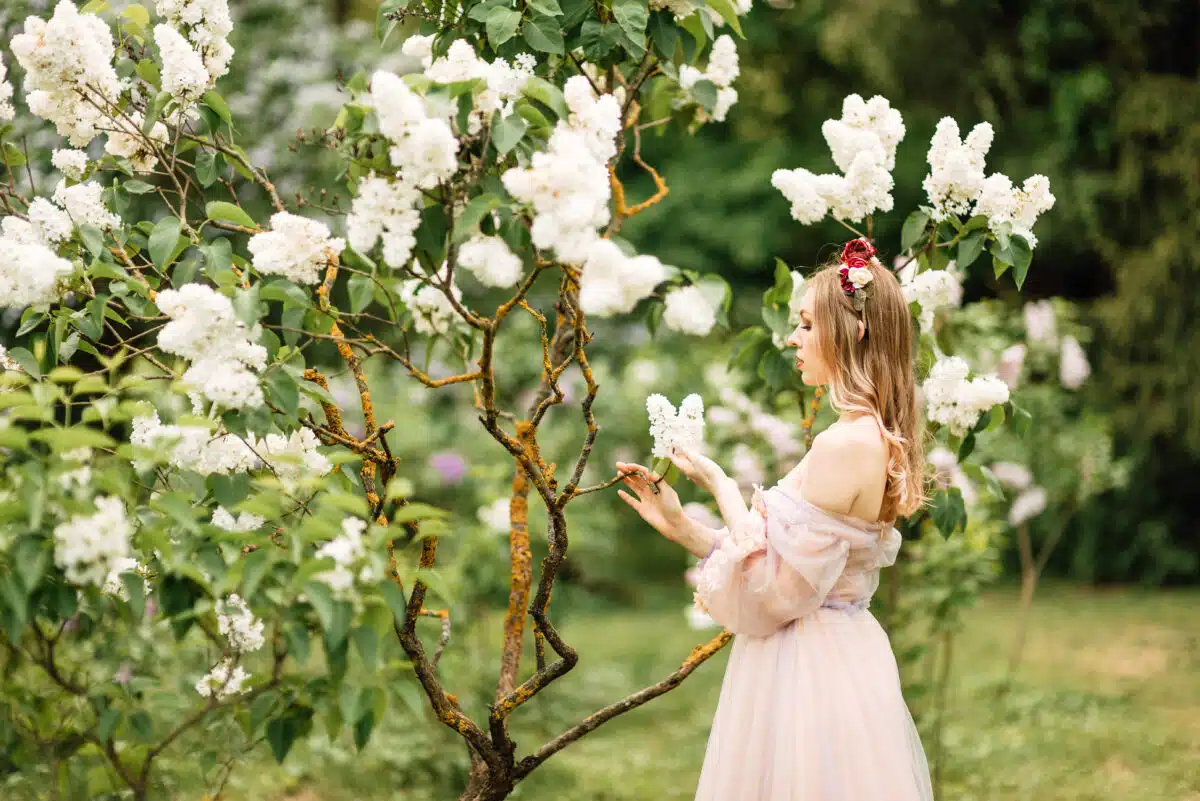
“Sonnet VI: To G. A. W.” by John Keats
Nymph of the downward smile and sidelong glance!
In what diviner moments of the day
Art thou most lovely?—when gone far astray
Into the labyrinths of sweet utterance,
Or when serenely wandering in a trance
Of sober thought? Or when starting away,
With careless robe to meet the morning ray,
Thou sparest the flowers in thy mazy dance?
Haply ‘ tis when thy ruby lips part sweetly,
And so remain, because thou listenest:
But thou to please wert nurtured so completely
That I can never tell what mood is best,
I shall as soon pronounce which Grace more neatly
Trips it before Apollo than the rest.
“Sonnet: Written On A Blank Page In Shakespeare’s Poems, Facing ‘A Lover’s Complaint'” by John Keats
Bright star! would I were steadfast as thou art
Not in lone splendour hung aloft the night,
And watching, with eternal lids apart,
Like Nature’s patient, sleepless Eremite,
The moving waters at their priestlike task
Of pure ablution round earth’s human shores,
Or gazing on the new soft fallen mask
Of snow upon the mountains and the moors
No-yet still steadfast, still unchangeable,
Pillow’d upon my fair love’s ripening breast,
To feel for ever its soft fall and swell,
Awake for ever in a sweet unrest,
Still, still to hear her tender-taken breath,
And so live ever-or else swoon to death.
“Fragment: Modern Love” by John Keats
And what is love? It is a doll dress’d up
For idleness to cosset, nurse, and dandle;
A thing of soft misnomers, so divine
That silly youth doth think to make itself
Divine by loving, nad so goes on
Yawning and doting a whole summer long,
Till Miss’s comb is made a perfect tiara,
And common Wellingtons turn Romeo boots;
Then Cleopatra lives at number seven,
And Antony resides in Brunswick Square.
Fools! if some passions high have warm’d the world,
If Queens and Soldiers have play’d deep for hearts,
It is no reason why such agonies
Should be more common than the growth of weeds.
Fools! make me whole again that weighty pearl
The Queen of Egypt melted, and I’ll say
That ye may love in spite of beaver hats.

“Sonnet: To A Lady Seen For A Few Moments At Vauxhall” by John Keats
Time’s sea hath been five years at its slow ebb,
Long hours have to and fro let creep the sand,
Since I was tangled in thy beauty’s web,
And snared by the ungloving of thine hand.
And yet I never look on midnight sky,
But I behold thine eyes’ well memory’d light;
I cannot look upon the rose’s dye,
But to thy cheek my soul doth take its flight.
I cannot look on any budding flower,
But my fond ear, in fancy at thy lips
And hearkening for a love-sound, doth devour
Its sweets in the wrong sense: Thou dost eclipse
Every delight with sweet remembering,
And grief unto my darling joys dost bring.
“Sonnet V: To A Friend Who Sent Me Some Roses” by John Keats
As late I rambled in the happy fields,
What time the skylark shakes the tremulous dew
From his lush clover covert; when anew
Adventurous knights take up their dinted shields;
I saw the sweetest flower wild nature yields,
A fresh-blown musk-rose; ’twas the first that threw
Its sweets upon the summer: graceful it grew
As is the wand that Queen Titania wields.
And, as I feasted on its fragrancy,
I thought the garden-rose it far excelled;
But when, O Wells! thy roses came to me,
My sense with their deliciousness was spelled:
Soft voices had they, that with tender plea
Whispered of peace, and truth, and friendliness unquelled.
“Sonnet: To A Young Lady Who Sent Me A Laurel Crown” by John Keats
Fresh morning gusts have blown away all fear
From my glad bosom, now from gloominess
I mount for ever not an atom less
Than the proud laurel shall content my bier.
No! by the eternal stars! or why sit here
In the Sun’s eye, and ‘gainst my temples press
Apollo’s very leaves, woven to bless
By thy white fingers and thy spirit clear.
Lo! who dares say, “Do this”? Who dares call down
My will from its high purpose? Who say,”Stand,”
Or, “Go”? This mighty moment I would frown
On abject Caesars not the stoutest band
Of mailed heroes should tear off my crown:
Yet would I kneel and kiss thy gentle hand!

“Fragment: Modern Love” by John Keats
The day is gone, and all its sweets are gone!
Sweet voice, sweet lips, soft hand, and softer breast,
Warm breath, light whisper, tender semitone,
Bright eyes, accomplished shape, and lang’rous waist!
Faded the flower and all its budded charms,
Faded the sight of beauty from my eyes,
Faded the shape of beauty from my arms,
Faded the voice, warmth, whiteness, paradise,
Vanished unseasonably at shut of eve,
When the dusk holiday, or holinight
Of fragrant-curtained love begins to weave
The woof of darkness thick, for hid delight;
But, as I’ve read love’s missal through today,
He’ll let me sleep, seeing I fast and pray.
“Sonnet X: To One Who Has Been Long In City Pent” by John Keats
To one who has been long in city pent,
‘Tis very sweet to look into the fair
And open face of heaven to breathe a prayer
Full in the smile of the blue firmament.
Who is more happy, when, with heart’s content,
Fatigued he sinks into some pleasant lair
Of wavy grass, and reads a debonair
And gentle tale of love and languishment?
Returning home at evening, with an ear
Catching the notes of Philomel, an eye
Watching the sailing cloudlet’s bright career,
He mourns that day so soon has glided by:
E’en like the passage of an angel’s tear
That falls through the clear ether silently.
Famous Love Poems by John Keats
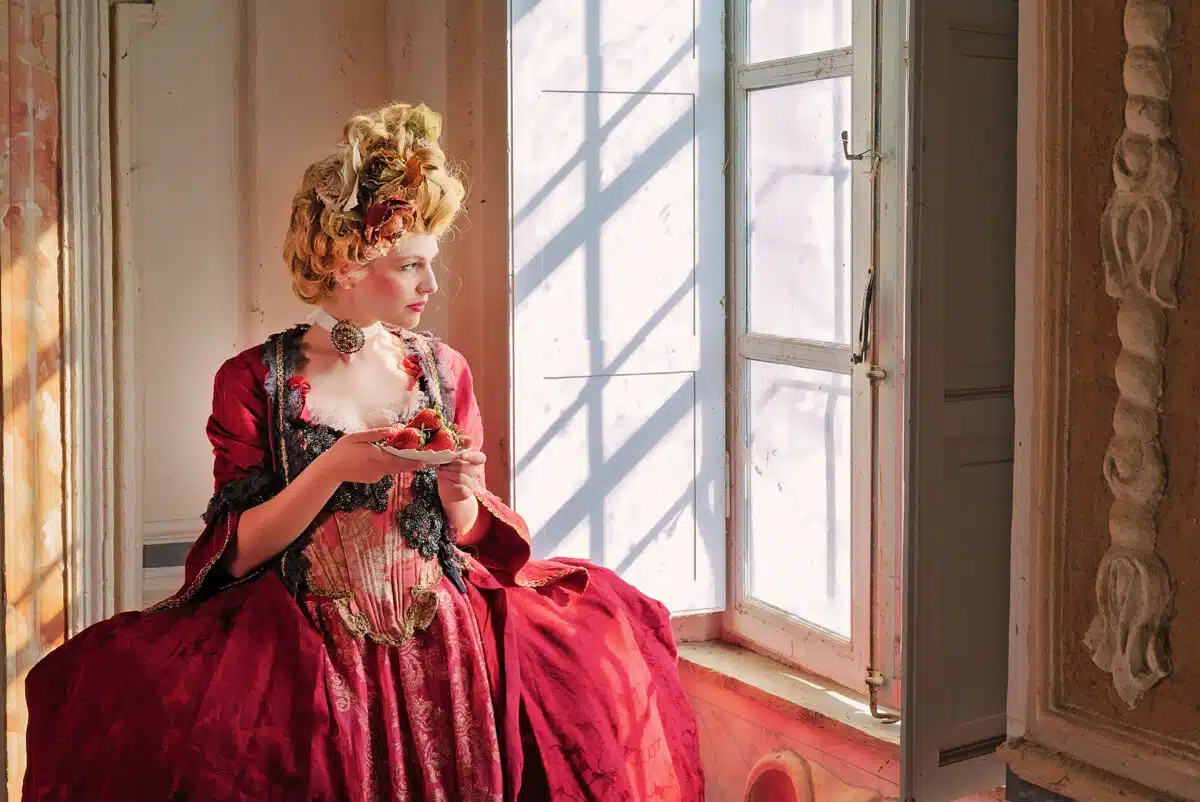
“La Belle Dame Sans Merci” by John Keats
Ah, what can ail thee, wretched wight,
Alone and palely loitering;
The sedge is withered from the lake,
And no birds sing.
Ah, what can ail thee, wretched wight,
So haggard and so woe-begone?
The squirrel’s granary is full,
And the harvest’s done.
I see a lilly on thy brow,
With anguish moist and fever dew;
And on thy cheek a fading rose
Fast withereth too.
I met a lady in the meads
Full beautiful, a faery’s child;
Her hair was long, her foot was light,
And her eyes were wild.
I set her on my pacing steed,
And nothing else saw all day long;
For sideways would she lean, and sing
A faery’s song.
I made a garland for her head,
And bracelets too, and fragrant zone;
She looked at me as she did love,
And made sweet moan.
She found me roots of relish sweet,
And honey wild, and manna dew;
And sure in language strange she said,
I love thee true.
She took me to her elfin grot,
And there she gazed and sighed deep,
And there I shut her wild sad eyes—
So kissed to sleep.
And there we slumbered on the moss,
And there I dreamed, ah woe betide,
The latest dream I ever dreamed
On the cold hill side.
I saw pale kings, and princes too,
Pale warriors, death-pale were they all;
Who cried—”La belle Dame sans merci
Hath thee in thrall!”
I saw their starved lips in the gloam
With horrid warning gaped wide,
And I awoke, and found me here
On the cold hill side.
And this is why I sojourn here
Alone and palely loitering,
Though the sedge is withered from the lake,
And no birds sing.
“Lines To Fanny” by John Keats
What can I do to drive away
Remembrance from my eyes? for they have seen,
Aye, an hour ago, my brilliant Queen!
Touch has a memory. O say, love, say,
What can I do to kill it and be free
In my old liberty?
When every fair one that I saw was fair
Enough to catch me in but half a snare,
Not keep me there:
When, howe’er poor or particolour’d things,
My muse had wings,
And ever ready was to take her course
Whither I bent her force,
Unintellectual, yet divine to me;
Divine, I say! What sea-bird o’er the sea
Is a philosopher the while he goes
Winging along where the great water throes?
How shall I do
To get anew
Those moulted feathers, and so mount once more
Above, above
The reach of fluttering Love,
And make him cower lowly while I soar?
Shall I gulp wine? No, that is vulgarism,
A heresy and schism,
Foisted into the canon law of love;
No, wine is only sweet to happy men;
More dismal cares
Seize on me unawares,
Where shall I learn to get my peace again?
To banish thoughts of that most hateful land,
Dungeoner of my friends, that wicked strand
Where they were wreck’d and live a wrecked life;
That monstrous region, whose dull rivers pour
Ever from their sordid urns unto the shore,
Unown’d of any weedy-haired gods;
Whose winds, all zephyrless, hold scourging rods,
Iced in the great lakes, to afflict mankind;
Whose rank-grown forests, frosted, black, and blind,
Would fright a Dryad; whose harsh herbag’d meads
Make lean and lank the starv’d ox while he feeds;
There flowers have no scent, birds no sweet song,
And great unerring Nature once seems wrong.
O, for some sunny spell
To dissipate the shadows of this hell!
Say they are gone, with the new dawning light
Steps forth my lady bright!
O, let me once more rest
My soul upon that dazzling breast!
Let once again these aching arms be plac’d,
The tender gaolers of thy waist!
And let me feel that warm breath here and there
To spread a rapture in my very hair,
O, the sweetness of the pain!
Give me those lips again!
Enough! Enough! it is enough for me
To dream of thee!
“Hither, Hither, Love” by John Keats
Hither hither, love–
‘Tis a shady mead–
Hither, hither, love!
Let us feed and feed!
Hither, hither, sweet–
‘Tis a cowslip bed–
Hither, hither, sweet!
‘Tis with dew bespread!
Hither, hither, dear
By the breath of life,
Hither, hither, dear!–
Be the summer’s wife!
Though one moment’s pleasure
In one moment flies–
Though the passion’s treasure
In one moment dies;–
Yet it has not passed–
Think how near, how near!–
And while it doth last,
Think how dear, how dear!
Hither, hither, hither
Love its boon has sent–
If I die and wither
I shall die content!
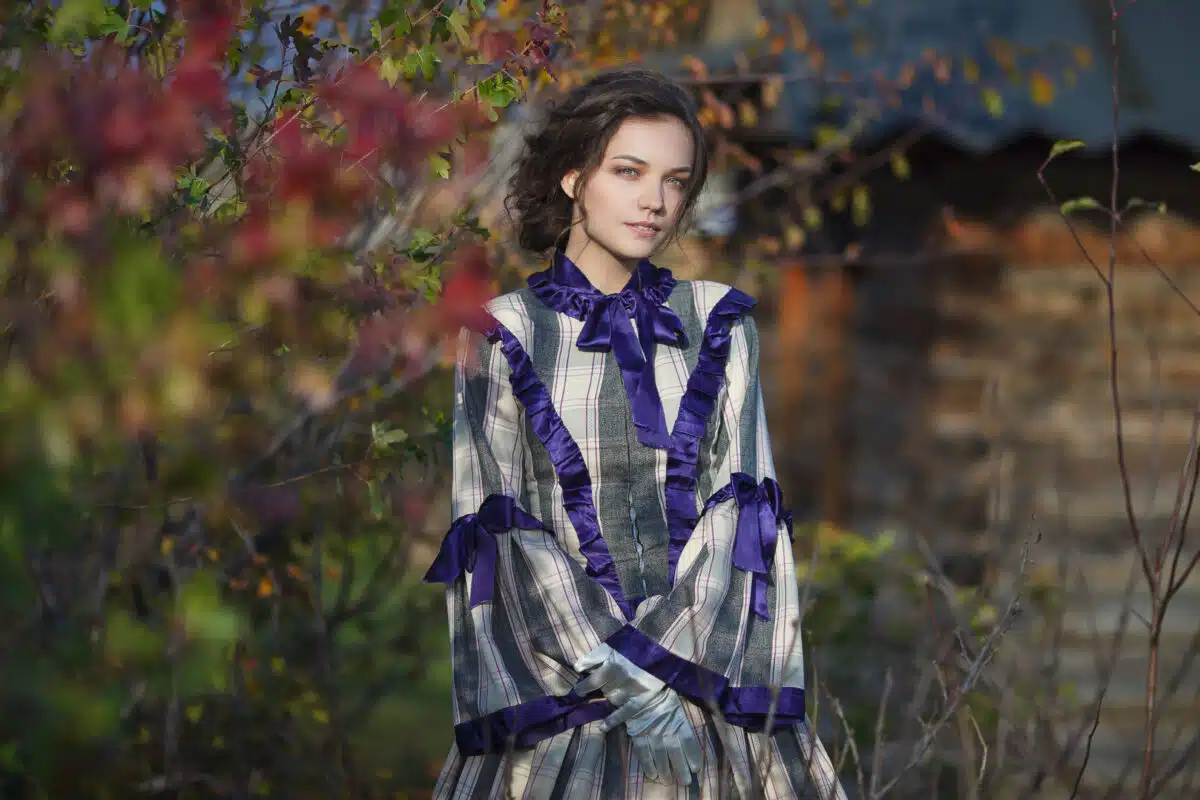
“From ‘Endymion: Book I’” by John Keats
A thing of beauty is a joy for ever:
Its loveliness increases; it will never
Pass into nothingness; but still will keep
A bower quiet for us, and a sleep
Full of sweet dreams, and health, and quiet breathing.
Therefore, on every morrow, are we wreathing
A flowery band to bind us to the earth,
Spite of despondence, of the inhuman dearth
Of noble natures, of the gloomy days,
Of all the unhealthy and o’er-darkened ways
Made for our searching: yes, in spite of all,
Some shape of beauty moves away the pall
From our dark spirits. Such the sun, the moon,
Trees old and young, sprouting a shady boon
For simple sheep; and such are daffodils
With the green world they live in; and clear rills
That for themselves a cooling covert make
‘Gainst the hot season; the mid forest brake,
Rich with a sprinkling of fair musk-rose blooms:
And such too is the grandeur of the dooms
We have imagined for the mighty dead;
All lovely tales that we have heard or read:
An endless fountain of immortal drink,
Pouring unto us from the heaven’s brink.
Nor do we merely feel these essences
For one short hour; no, even as the trees
That whisper round a temple become soon
Dear as the temple’s self, so does the moon,
The passion poesy, glories infinite,
Haunt us till they become a cheering light
Unto our souls, and bound to us so fast,
That, whether there be shine, or gloom o’ercast,
They alway must be with us, or we die.
Therefore, ’tis with full happiness that I
Will trace the story of Endymion.
The very music of the name has gone
Into my being, and each pleasant scene
Is growing fresh before me as the green
Of our own vallies: so I will begin
Now while I cannot hear the city’s din;
Now while the early budders are just new,
And run in mazes of the youngest hue
About old forests; while the willow trails
Its delicate amber; and the dairy pails
Bring home increase of milk. And, as the year
Grows lush in juicy stalks, I’ll smoothly steer
My little boat, for many quiet hours,
With streams that deepen freshly into bowers.
Many and many a verse I hope to write,
Before the daisies, vermeil rimm’d and white,
Hide in deep herbage; and ere yet the bees
Hum about globes of clover and sweet peas,
I must be near the middle of my story.
O may no wintry season, bare and hoary,
See it half finished: but let Autumn bold,
With universal tinge of sober gold,
Be all about me when I make an end.
And now at once, adventuresome, I send
My herald thought into a wilderness:
There let its trumpet blow, and quickly dress
My uncertain path with green, that I may speed
Easily onward, thorough flowers and weed.
“Ode To Fanny” by John Keats
Physician Nature! let my spirit blood!
O ease my heart of verse and let me rest;
Throw me upon thy tripod, till the flood
Of stifling numbers ebbs from my full breast.
A theme! a theme! Great Nature! give a theme;
Let me begin my dream.
I come—I see thee, as thou standest there,
Beckon me out into the wintry air.
Ah! dearest love, sweet home of all my fears
And hopes and joys and panting miseries,—
To-night, if I may guess, thy beauty wears
A smile of such delight,
As brilliant and as bright,
As when with ravished, aching, vassal eyes,
Lost in a soft amaze,
I gaze, I gaze!
Who now, with greedy looks, eats up my feast?
What stare outfaces now my silver moon!
Ah! keep that hand unravished at the least;
Let, let the amorous burn—
But, prithee, do not turn
The current of your heart from me so soon:
O save, in charity,
The quickest pulse for me.
Save it for me, sweet love! though music breathe
Voluptuous visions into the warm air,
Though swimming through the dance’s dangerous wreath,
Be like an April day,
Smiling and cold and gay,
A temperate lily, temperate as fair;
Then, heaven! there will be
A warmer June for me.
Why this, you’ll say—my Fanny!—is not true;
Put your soft hand upon your snowy side,
Where the heart beats: confess—’tis nothing new –
Must not a woman be
A feather on the sea,
Swayed to and fro by every wind and tide?
Of as uncertain speed
As blow-ball from the mead?
I know it—and to know it is despair
To one who loves you as I love, sweet Fanny,
Whose heart goes fluttering for you every where,
Nor when away you roam,
Dare keep its wretched home:
Love, love alone, has pains severe and many;
Then, loveliest! keep me free
From torturing jealousy.
Ah! if you prize my subdued soul above
The poor, the fading, brief pride of an hour:
Let none profane my Holy See of Love,
Or with a rude hand break
The sacramental cake:
Let none else touch the just new-budded flower;
If not—may my eyes close,
Love, on their last repose!
“To—” by John Keats
Think not of it, sweet one, so;
Give it not a tear;
Sigh thou mayst, and bid it go
Any, any where.
Do not look so sad, sweet one,
Sad and fadingly;
Shed one drop then, it is gone,
O ’twas born to die!
Still so pale? then, dearest, weep;
Weep, I’ll count the tears,
And each one shall be a bliss
For thee in after years.
Brighter has it left thine eyes
Than a sunny rill;
And thy whispering melodies
Are tenderer still.
Yet, as all things mourn awhile
At fleeting blisses,
E’en let us too! but be our dirge
A dirge of kisses.
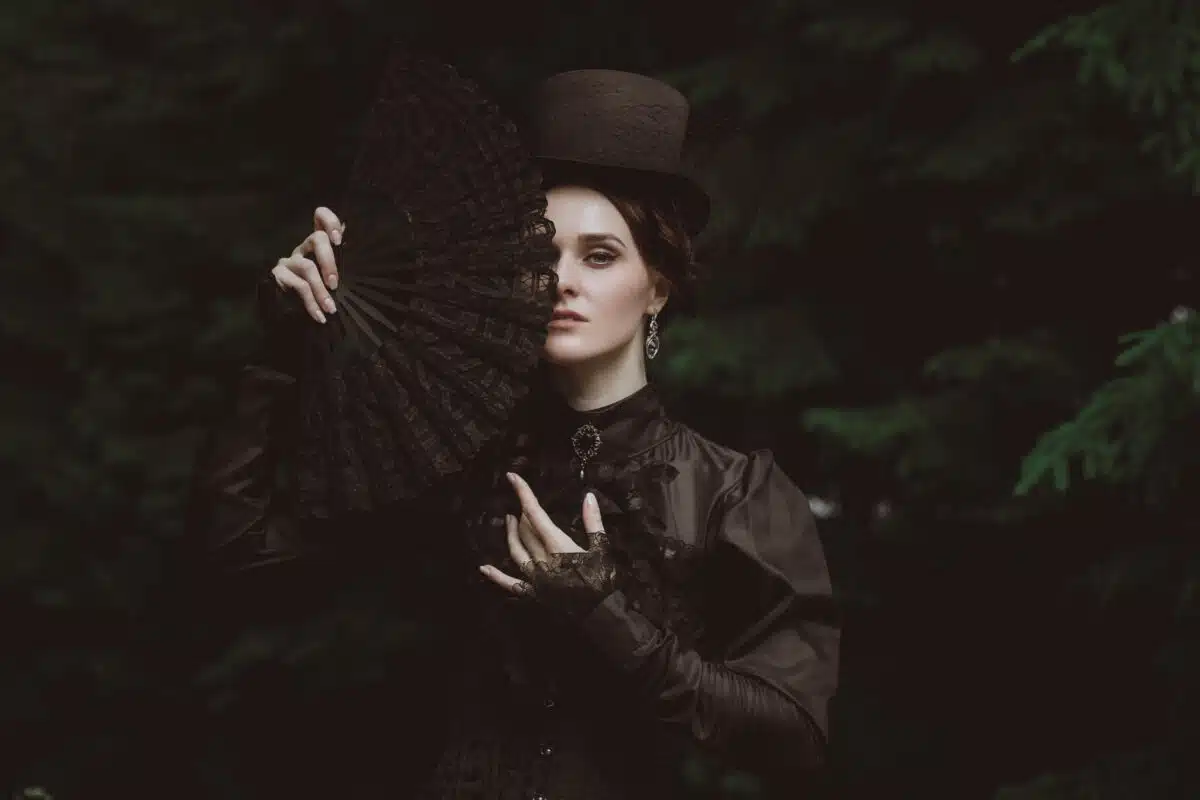
“Lines” by John Keats
I.
Unfelt unheard, unseen,
I’ve left my little queen,
Her languid arms in silver slumber lying:
Ah! through their nestling touch,
Who, who could tell how much
There is for madness, cruel, or complying?
II.
Those faery lids how sleek!
Those lips how moist! they speak,
In ripest quiet, shadows of sweet sounds:
Into my fancy’s ear
Melting a burden dear,
How “Love doth know no fullness, nor no bounds.”
III.
True, tender monitors!
I bend unto your laws:
This sweetest day for dalliance was born!
So, without more ado,
I’ll feel my heaven anew,
For all the blushing of the hasty morn.
“Ode on a Grecian Urn” by John Keats
Thou still unravish’d bride of quietness,
Thou foster-child of silence and slow time,
Sylvan historian, who canst thus express
A flowery tale more sweetly than our rhyme:
What leaf-fring’d legend haunts about thy shape
Of deities or mortals, or of both,
In Tempe or the dales of Arcady?
What men or gods are these? What maidens loth?
What mad pursuit? What struggle to escape?
What pipes and timbrels? What wild ecstasy?
Heard melodies are sweet, but those unheard
Are sweeter; therefore, ye soft pipes, play on;
Not to the sensual ear, but, more endear’d,
Pipe to the spirit ditties of no tone:
Fair youth, beneath the trees, thou canst not leave
Thy song, nor ever can those trees be bare;
Bold Lover, never, never canst thou kiss,
Though winning near the goal yet, do not grieve;
She cannot fade, though thou hast not thy bliss,
For ever wilt thou love, and she be fair!
Ah, happy, happy boughs! that cannot shed
Your leaves, nor ever bid the Spring adieu;
And, happy melodist, unwearied,
For ever piping songs for ever new;
More happy love! more happy, happy love!
For ever warm and still to be enjoy’d,
For ever panting, and for ever young;
All breathing human passion far above,
That leaves a heart high-sorrowful and cloy’d,
A burning forehead, and a parching tongue.
Who are these coming to the sacrifice?
To what green altar, O mysterious priest,
Lead’st thou that heifer lowing at the skies,
And all her silken flanks with garlands drest?
What little town by river or sea shore,
Or mountain-built with peaceful citadel,
Is emptied of this folk, this pious morn?
And, little town, thy streets for evermore
Will silent be; and not a soul to tell
Why thou art desolate, can e’er return.
O Attic shape! Fair attitude! with brede
Of marble men and maidens overwrought,
With forest branches and the trodden weed;
Thou, silent form, dost tease us out of thought
As doth eternity: Cold Pastoral!
When old age shall this generation waste,
Thou shalt remain, in midst of other woe
Than ours, a friend to man, to whom thou say’st,
“Beauty is truth, truth beauty,—that is all
Ye know on earth, and all ye need to know.”
“Stanzas To Miss Wylie” by John Keats
O come Georgiana! the rose is full blown,
The riches of Flora are lavishly strown,
The air is all softness, and crystal the streams,
The West is resplendently clothed in beams.
O come! let us haste to the freshening shades,
The quaintly carv’d seats, and the opening glades;
Where the faeries are chanting their evening hymns,
And in the last sun-beam the sylph lightly swims.
And when thou art weary I’ll find thee a bed,
Of mosses and flowers to pillow thy head:
And there Georgiana I’ll sit at thy feet,
While my story of love I enraptur’d repeat.
So fondly I’ll breathe, and so softly I’ll sigh,
Thou wilt think that some amorous Zephyr is nigh:
Yet no, as I breathe I will press thy fair knee,
And then thou wilt know that the sigh comes from me.
Ah! why dearest girl should we lose all these blisses?
That mortal’s a fool who such happiness misses:
So smile acquiescence, and give me thy hand,
With love-looking eyes, and with voice sweetly bland.
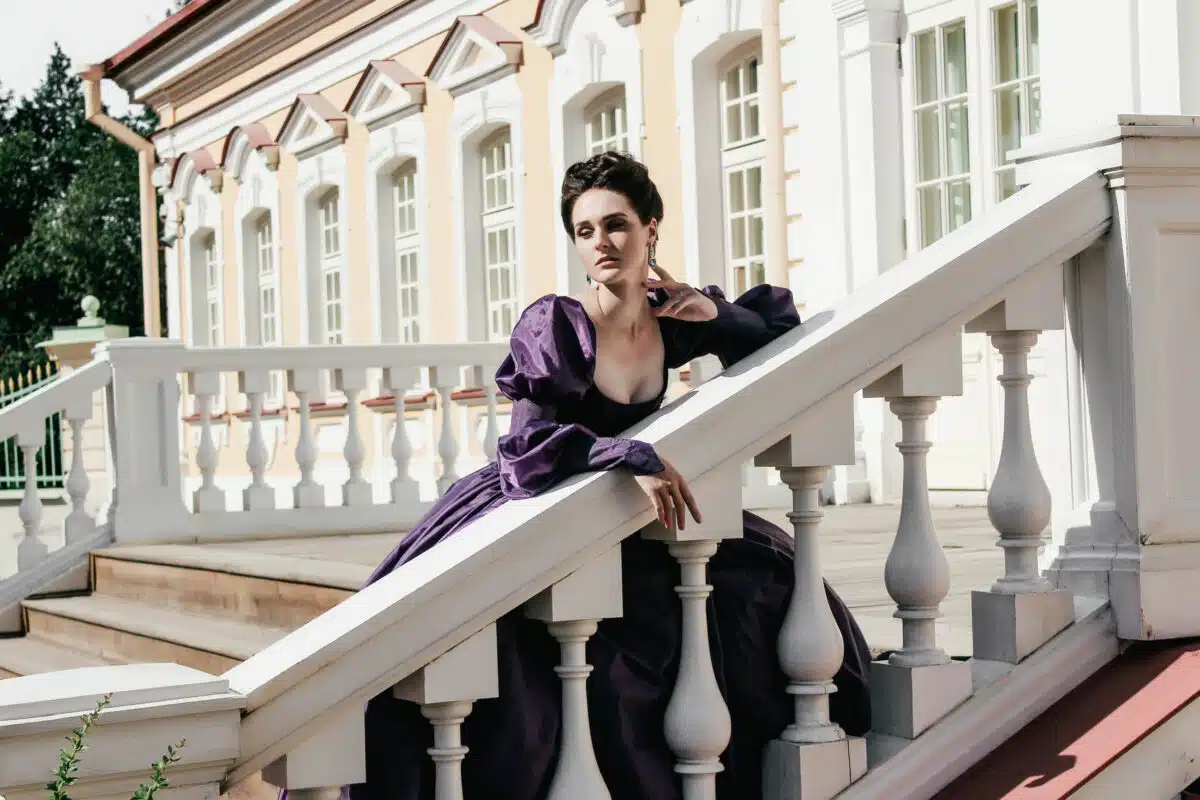
From “Endymion: Book II” by John Keats
O Sovereign power of love! O grief! O balm!
All records, saving thine, come cool, and calm,
And shadowy, through the mist of passed years:
For others, good or bad, hatred and tears
Have become indolent; but touching thine,
One sigh doth echo, one poor sob doth pine,
One kiss brings honey-dew from buried days.
The woes of Troy, towers smothering o’er their blaze,
Stiff-holden shields, far-piercing spears, keen blades,
Struggling, and blood, and shrieks–all dimly fades
Into some backward corner of the brain;
Yet, in our very souls, we feel amain
The close of Troilus and Cressid sweet.
Hence, pageant history! hence, gilded cheat!
Swart planet in the universe of deeds!
Wide sea, that one continuous murmur breeds
Along the pebbled shore of memory!
Many old rotten-timber’d boats there be
Upon thy vaporous bosom, magnified
To goodly vessels; many a sail of pride,
And golden keel’d, is left unlaunch’d and dry.
But wherefore this? What care, though owl did fly
About the great Athenian admiral’s mast?
What care, though striding Alexander past
The Indus with his Macedonian numbers?
Though old Ulysses tortured from his slumbers
The glutted Cyclops, what care?–Juliet leaning
Amid her window-flowers,–sighing,—weaning
Tenderly her fancy from its maiden snow,
Doth more avail than these: the silver flow
Of Hero’s tears, the swoon of Imogen,
Fair Pastorella in the bandit’s den,
Are things to brood on with more ardency
Than the death-day of empires. Fearfully
Must such conviction come upon his head,
Who, thus far, discontent, has dared to tread,
Without one muse’s smile, or kind behest,
The path of love and poesy. But rest,
In chaffing restlessness, is yet more drear
Than to be crush’d, in striving to uprear
Love’s standard on the battlements of song.
So once more days and nights aid me along,
Like legion’d soldiers.
Brain-sick shepherd-prince,
What promise hast thou faithful guarded since
The day of sacrifice? Or, have new sorrows
Come with the constant dawn upon thy morrows?
Alas! ’tis his old grief. For many days,
Has he been wandering in uncertain ways:
Through wilderness, and woods of mossed oaks;
Counting his woe-worn minutes, by the strokes
Of the lone woodcutter; and listening still,
Hour after hour, to each lush-leav’d rill.
Now he is sitting by a shady spring,
And elbow-deep with feverous fingering
Stems the upbursting cold: a wild rose tree
Pavilions him in bloom, and he doth see
A bud which snares his fancy: lo! but now
He plucks it, dips its stalk in the water: how!
It swells, it buds, it flowers beneath his sight;
And, in the middle, there is softly pight
A golden butterfly; upon whose wings
There must be surely character’d strange things,
For with wide eye he wonders, and smiles oft.
“Ode To Psyche” by John Keats
And what is love? It is a doll dress’d up
For idleness to cosset, nurse, and dandle;
A thing of soft misnomers, so divine
That silly youth doth think to make itself
Divine by loving, nad so goes on
Yawning and doting a whole summer long,
Till Miss’s comb is made a perfect tiara,
And common Wellingtons turn Romeo boots;
Then Cleopatra lives at number seven,
And Antony resides in Brunswick Square.
Fools! if some passions high have warm’d the world,
If Queens and Soldiers have play’d deep for hearts,
It is no reason why such agonies
Should be more common than the growth of weeds.
Fools! make me whole again that weighty pearl
The Queen of Egypt melted, and I’ll say
That ye may love in spite of beaver hats.
“The Eve Of St. Agnes” by John Keats
I.
St. Agnes’ Eve—Ah, bitter chill it was!
The owl, for all his feathers, was a—cold;
The hare limp’d trembling through the frozen grass,
And silent was the flock in woolly fold:
Numb were the Beadsman’s fingers, while he told
His rosary, and while his frosted breath,
Like pious incense from a censer old,
Seem’d taking flight for heaven, without a death,
Past the sweet Virgin’s picture, while his prayer he saith.
II.
His prayer he saith, this patient, holy man;
Then takes his lamp, and riseth from his knees,
And back returneth, meagre, barefoot, wan,
Along the chapel aisle by slow degrees:
The sculptur’d dead, on each side, seem to freeze,
Emprison’d in black, purgatorial rails:
Knights, ladies, praying in dumb oratʼries,
He passeth by; and his weak spirit fails
To think how they may ache in icy hoods and mails.
III.
Northward he turneth through a little door,
And scarce three steps, ere Music’s golden tongue
Flatter’d to tears this aged man and poor;
But no-already had his deathbell rung;
The joys of all his life were said and sung:
His was harsh penance on St. Agnes’ Eve:
Another way he went, and soon among
Rough ashes sat he for his soul’s reprieve,
And all night kept awake, for sinners’ sake to grieve.
IV.
That ancient Beadsman heard the prelude soft;
And so it chanc’d, for many a door was wide,
From hurry to and fro. Soon, up aloft,
The silver, snarling trumpets ‘ gan to chide:
The level chambers, ready with their pride,
Were glowing to receive a thousand guests:
The carved angels, ever eager-eyed,
Star’d, where upon their heads the cornice rests,
With hair blown back, and wings put cross-wise on their
breasts.
V.
At length burst in the argent revelry,
With plume, tiara, and all rich array,
Numerous as shadows haunting fairily
The brain, newstuff’d, in youth, with triumphs gay
Of old romance. These let us wish away,
And turn, sole-thoughted, to one Lady there,
Whose heart had brooded, all that wintry day,
On love, and wing’d St. Agnes’ saintly care,
As she had heard old dames full many times declare.
VI.
They told her how, upon St. Agnes’ Eve,
Young virgins might have visions of delight,
And soft adorings from their loves receive
Upon the honey’d middle of the night,
If ceremonies due they did aright;
As, supperless to bed they must retire,
And couch supine their beauties, lily white;
Nor look behind, nor sideways, but require
Of Heaven with upward eyes for all that they desire.
VII.
Full of this whim was thoughtful Madeline:
The music, yearning like a God in pain,
She scarcely heard : her maiden eyes divine,
Fix’d on the floor, saw many a sweeping train
Pass by-she heeded not at all: in vain
Came many a tiptoe, amorous cavalier,
And back retir’d; not cool’d by high disdain,
But she saw not: her heart was otherwhere:
She sigh❜d for Agnes’ dreams, the sweetest of the year.
VIII.
She danc’d along with vague, regardless eyes,
Anxious her lips, her breathing quick and short:
The hallow’d hour was near at hand: she sighs
Amid the timbrels, and the throng’d resort
Of whisperers in anger, or in sport;
‘Mid looks oflove, defiance, hate, and scorn,
Hoodwink’d with faery fancy; all amort,
Save to St. Agnes and her lambs unshorn,
And all the bliss to be before to-morrow morn.
IX.
So, purposing each moment to retire,
She linger’d still. Meantime, across the moors,
Had come young Porphyro, with heart on fire
For Madeline. Beside the portal doors,
Buttress’d from moonlight, stands he, and implores
All saints to give him sight of Madeliné,
But for one moment in the tedious hours,
That he might gaze and worship all unseen ;
Perchance speak, kneel, touch, kiss-in sooth such things
have been.
X.
He ventures in: let no buzz’d whisper tell;
All eyes be muffled, or a hundred swords
Will storm his heart, Love’s fev’rous citadel:
For him, those chambers held barbarian hordes,
Hyena foemen, and hot-blooded lords,
Whose very dogs would execrations howl
Against his lineage : not one breast affords
Him any mercy, in that mansion foul,
Save one old beldame, weak in body and in soul.
XI.
Ah, happy chance ! the aged creature came,
Shuffling along with ivory-headed wand,
To where he stood, hid from the torch’s flame,
Behind a broad hall-pillar, far beyond
The sound of merriment and chorus bland:
He startled her ; but soon she knew his face,
And grasp’d his fingers in her palsied hand,
Saying, ” Mercy, Porphyro ! hie thee from this place;
“They areall here to-night, thewhole blood-thirsty race!
XII.
“Get hence ! get hence! there’s dwarfish Hildebrand;
“He had a fever late, and in the fit
“He cursed thee and thine, both house and land:
“Then there’s that old Lord Maurice, not a whit
“More tame for his gray hairs—Alas me flit!
“Flit like a ghost away.”—”Ah, Gossip dear,
“We’re safe enough; here in this arm-chair sit,
“And tellme how” “Good Saints! not here, not here;
” Follow me, child, or else these stones will be thy bier.”
XIII.
He follow’d through a lowly arched way,
Brushing the cobwebs with his lofty plume,
And as she mutter’d “Well-a-well- a-day!”
He found him in a little moonlight room,
Pale, lattic’d, chill, and silent as a tomb.
“Now tell me where is Madeline,” said he,
“O tell me, Angela, by the holy loom
“Which none but secret sisterhood may see,
“When they St. Agnes’ wool are weaving piously.”
XIV.
“St. Agnes ! Ah! it is St. Agnes’ Eve-
“Yet men will murder upon holy days :
“Thou must hold water in a witch’s sieve,
“And be liege-lord of all the Elves and Fays,
” To venture so it fills me with amaze
“To see thee, Porphyro !-St. Agnes’ Eve!
“God’s help ! my lady fair the conjuror plays
“This very night : good angels her deceive!
“But let me laugh awhile, I’ve mickle time to grieve.”
XV.
Feebly she laugheth in the languid moon,
While Porphyro upon her face doth look,
Like puzzled urchin on an aged crone
Who keepeth clos’d a wond’rous riddle-book,
As spectacled she sits in chimney nook.
But soon his eyes grew brilliant, when she told
His lady’s purpose ; and he scarce could brook
Tears, at the thought of those enchantments cold,
And Madeline asleep in lap of legends old.
XVI.
Sudden a thought came like a full-blown rose,
Flushing his brow, and in his pained heart
Made purple riot : then doth he propose
A stratagem, that makes the beldame start:
“A cruel man and impious thou art:
“Sweet lady, let her pray, and sleep, and dream
“Alone with her good angels, far apart
“From wicked men like thee. Go, go! -I deem
” Thou canst not surely be the same that thou didst seem.
XVII.
” I will not harm her, by all saints I swear,”
Quoth Porphyro: “O may I ne’er find grace
“ When my weak voice shall whisper its last prayer,
” If one of her soft ringlets I displace,
” Or look with ruffian passion in her face :
“Good Angela, believe me by these tears ;
” Or I will, even in a moment’s space,
‘ Awake, with horrid shout, my foemen’s ears,
“And beard them, though they be more fang’d than
wolves and bears.”
XVIII.
“Ah! why wilt thou affright a feeble soul?
“A poor, weak, palsy-stricken, churchyard thing,
“Whose passing- bell may ere the midnight toll;
“Whose prayers for thee, each morn and evening,
“Were never miss’d. ” -Thus plaining, doth she bring
A gentler speech from burning Porphyro;
So woful, and of such deep sorrowing,
That Angela gives promise she will do
Whatever he shall wish, betide her weal or woe.
XIX.
Which was, to lead him, in close secrecy,
Even to Madeline’s chamber, and there hide
Him in a closet, of such privacy
That he might see her beauty unespied,
And win perhaps that night a peerless bride,
While legion’d fairies pac’d the coverlet,
And pale enchantment held her sleepy-eyed.
Never on such a night have lovers met,
Since Merlin paid his Demon all the monstrous debt,
XX.
“It shall be as thou wishest,” said the Dame :
” All cates and dainties shall be stored there
Quickly on this feast-night : by the tambour frame
” Her own lute thou wilt see : no time to spare,
“For I am slow and feeble, and scarce dare
“On such a catering trust my dizzy head.
“Waithere, my child, with patience ; kneel in prayer
“The while Ah ! thou must needs the lady wed,
“Or may I never leave my grave among the dead.”
XXI.
So saying, she hobbled off with busy fear.
The lover’s endless minutes slowly pass’d;
The dame return’d, and whisper’d in his ear
To follow her; with aged eyes aghast
From fright of dim espial. Safe at last,
Through many a dusky gallery, they gain
The maiden’s chamber, silken, hush’d, and chaste;
Where Porphyro took covert, pleas’d amain.
His poor guide hurried back with agues in her brain.
XXII.
Her falt’ring hand upon the balustrade,
Old Angela was feeling for the stair,
When Madeline, St. Agnes’ charmed maid,
Rose, like a mission’d spirit, unaware :
With silver taper’s light, and pious care,
She turn’d, and down the aged gossip led
To a safe level matting. Now prepare,
Young Porphyro, for gazing on that bed ;
She comes, she comes again, like ring-dove fray’d and fled.
XXIII.
Out went the taper as she hurried in;
Its little smoke, in pallid moonshine, died:
She clos’d the door, she panted, all akin
To spirits of the air, and visions wide:
No uttered syllable, or, woe betide!
But to her heart, her heart was voluble,
Paining with eloquence her balmy side ;
As though a tongueless nightingale should swell
Her throat in vain, and die, heart-stifled, in her dell.
XXIV.
A casement high and triple-arch’d there was,
All garlanded with carven imag’ries
Offruits, and flowers, and bunches of knot-grass,
And diamonded with panes of quaint device,
Innumerable of stains and splendid dyes,
As are the tiger-moth’s deep- damask’d wings;
And in the midst, ‘mong thousand heraldries,
And twilight saints, and dim emblazonings,
A shielded scutcheon blush’d with blood of queens and
kings.
XXV.
Full on this casement shone the wintry moon,
And threw warm gules on Madeline’s fair breast,
As down she knelt for heaven’s grace and boon ;
Rose-bloom fell on her hands, together prest,
And on her silver cross soft amethyst,
And on her hair a glory, like a saint :
She seem’d a splendid angel, newly drest,
Save wings; for heaven :-Porphyro grew faint :
She knelt, so pure a thing, so free from mortal taint.
XXVI.
Anon his heart revives : her vespers done,
Of all its wreathed pearls her hair she frees;
Unclasps her warmed jewels one by one;
Loosens her fragrant boddice; by degrees
Her rich attire creeps rustling to her knees :
Half-hidden, like a mermaid in sea-weed,,
Pensive awhile she dreams awake, and sees,
In fancy, fair St. Agnes in her bed,
But dares not look behind, or all the charm is fled.
XXVII.
Soon, trembling in her soft and chilly nest,
In sort of wakeful swoon, perplex’d she lay,
Until the poppied warmth of sleep oppress’d
Her soothed limbs, and soul fatigued away;
Flown, like a thought, until the morrow-day ;
Blissfully haven’d both from joy and pain;
Clasp’d like a missal where swart Paynims pray;
Blinded alike from sunshine and from rain,
As though a rose should shut, and be a bud again.
XXVIII.
Stol’n to this paradise, and so entranced,
Porphyro gazed upon her empty dress,
And listen’d to her breathing, if it chanced
To wake into a slumberous tenderness;
Which when he heard, that minute did he bless,
And breath’d himself: then from the closet crept,
Noiseless as fear in a wide wilderness,
And over the hush’d carpet, silent, stept,
And ‘ tween the curtains peep’d, where, lo ! -how fast
she slept.
XXIX.
Then by the bed- side, where the faded moon
Made a dim, silver twilight, soft he set
A table, and, half anguish’d, threw thereon
A cloth of woven crimson, gold, and jet: –
Ofor some drowsy Morphean amulet !
The boisterous, midnight, festive clarion,
The kettle-drum, and far-heard clarionet,
Affray his ears, though but in dying tone:–
The hall door shuts again, and all the noise is gone.
XXX.
And still she slept an azure-lidded sleep,
In blanched linen, smooth, and lavender’d,
While he from forth the closet brought a heap
Of candied apple, quince, and plum, and gourd;
With jellies soother than the creamy curd,
And lucent syrops, tinct with cinnamon;
Manna and dates, in argosy transferr’d
From Fez ; and spiced dainties, every one,
From silken Samarcand to cedar’d Lebanon.
XXXI.
These delicates he heap’d with glowing hand
On golden dishes and in baskets bright
Of wreathed silver : sumptuous they stand
In the retired quiet of the night,
Filling the chilly room with perfume light.-
” And now, my love, my seraph fair, awake!
“Thou art my heaven, and I thine eremite:
“Open thine eyes, for meek St. Agnes’ sake,
“Or I shall drowse beside thee, so my soul doth ache.”
XXXII.
Thus whispering, his warm, unnerved arm
Sank in her pillow. Shaded was her dream
By the dusk curtains : -’twas a midnight charm
Impossible to melt as iced stream:
The lustrous salvers in the moonlight gleam;
Broad golden fringe upon the carpet lies:
It seem’d he never, never could redeem
From such a stedfast spell his lady’s eyes;
So mus’d awhile, entoil’d in woofed phantasies.
XXXIII.
Awakening up, he took her hollow lute, –
Tumultuous, and, in chords that tenderest be,
He play’d an ancient ditty, long since mute,
In Provence call’d , “La belle dame sans mercy:”
Close to her ear touching the melody; –
Wherewith disturb’d, she utter’d a soft moan:
He ceased-she panted quick-and suddenly
Her blue affrayed eyes wide open shone:
Upon his knees he sank, pale as smooth- sculptured stone.
XXXIV.
Her eyes were open, but she still beheld,
Now wide awake, the vision of her sleep:
There was a painful change, that nigh expell’d.
The blisses of her dream so pure and deep
At which fair Madeline began to weep,
And moan forth witless words with many a sigh;
While still her gaze on Porphyro would keep;
Who knelt, with joined hands and piteous eye,
Fearing to move or speak, she look’d so dreamingly.
XXXV.
Ah, Porphyro !” said she, “but even now
Thy voice was at sweet tremble in mine ear,
“Made tuneable with every sweetest vow;
“And those sad eyes were spiritual and clear:
“Howchang’d thou art! how pallid, chill, and drear!
” Give me that voice again, my Porphyro,
“Those looks immortal, those complainings dear!
” Oh leave me not in this eternal woe,
“For if thou diest, my Love, I know not where to go.”
XXXVI.
Beyond a mortal man impassion’d far
At these voluptuous accents, he arose,
Ethereal, flush’d, and like a throbbing star
Seen mid the sapphire heaven’s deep repose ;
Into her dream he melted, as the rose
Blendeth its odour with the violet, –
Solution sweet : meantime the frost-wind blows
Like Love’s alarum pattering the sharp sleet
Against the window-panes ; St. Agnes’ moon hath set.
XXXVII.
‘Tis dark : quick pattereth the flaw-blown sleet:
” This is no dream, my bride, my Madeline !”
‘Tis dark the iced gusts still rave and beat :
” No dream, alas ! alas ! and woe is mine !
Porphyro will leave me here to fade and pine.—
“Cruel ! what traitor could thee hither bring?
” I curse not, for my heart is lost in thine,
Though thou forsakest a deceived thing ;—
“A dove forlorn and lost with sick unpruned wing.”
XXXVIII.
My Madeline ! sweet dreamer! lovely bride!
Say, may I be for aye thy vassal blest?
Thy beauty’s shield, heart- shap’d and vermeil dyed?
“Ah, silver shrine, here will I take my rest
“After so many hours of toil and quest,
“A famish’d pilgrim, -saved by miracle.
“Though I have found, I will not rob thy nest
Saving of thy sweet self; if thou think’st well
“To trust, fair Madeline, to no rude infidel.”
XXXIX.
“Hark! ‘ tis an elfin-storm from faery land,
” Of haggard seeming, but a boon indeed:
“Arise-arise ! the morning is at hand;-
“The bloated wassaillers will never heed :
” Let us away, my love, with happy speed;
” There are no ears to hear, or eyes to see, –
” Drown’d all in Rhenish and the sleepy mead:
“Awake ! arise ! my love, and fearless be,
” For o’er the southern moors I have a home for thee.”
XL.
She hurried at his words, beset with fears,
For there were sleeping dragons all around,
At glaring watch, perhaps, with ready spears
Down the wide stairs a darkling way they found.-
In all the house was heard no human sound.
A chain-droop’d lamp was flickering by each door ;
The arras, rich with horseman, hawk, and hound,
Flutter’d in the besieging wind’s uproar;
And the long carpets rose along the gusty floor.
XLI.
They glide, like phantoms, into the wide hall;
Like phantoms, to the iron porch, they glide;
Where lay the Porter, in uneasy sprawl,
With a huge empty flaggon by his side:
The wakeful bloodhound rose, and shook his hide,
But his sagacious eye an inmate owns:
By one, and one, the bolts full easy slide:-
The chains lie silent on the footworn stones ;-
The key turns, and the door upon its hinges groans.
XLII.
And they are gone : ay, ages long ago
These lovers fled away into the storm.
That night the Baron dreamt of many a woe,
And all his warrior-guests, with shade and form
Of witch, and demon, and large coffin- worm,
Were long be-nightmar’d. Angela the old
Died palsy-twitch’d, with meagre face deform;
The Beadsman, after thousand aves told,
For aye unsought for slept among his ashes c
- 53 Best Poems by John Keats
- 55 Best Poems by William Shakespeare
- 27 Best Poems by Arthur Rimbaud
- 47 Best Poems by Edgar Allan Poe
- 43 Best Poems by Rumi
- 35 Bewitching Love Poems by Rumi
- 47 Admirable Love Poems by William Butler Yeats
- 21 Absorbing Love Poems by Pablo Neruda
- 49 Consuming Love Poems by Shakespeare
